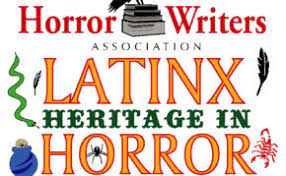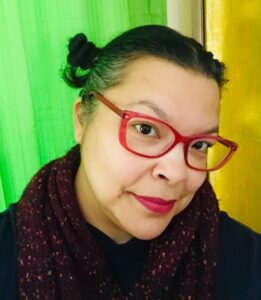Latinx Heritage in Horror: Interview with Lisa M. Bradley

Originally from South Texas, Lisa M. Bradley now lives in Iowa, the traditional homeland of the Iowa, Meskwaki, and Sauk Nations, among others. Her work has been featured on the LeVar Burton Reads podcast and in venues such as Lightspeed, Beneath Ceaseless Skies, Uncanny, and The Moment of Change: An Anthology of Feminist Speculative Poetry. She has poetry forthcoming in The Magazine of Fantasy and Science Fiction. Her short fiction and poetry collection is The Haunted Girl (Aqueduct Press). Her debut novel is Exile (Rosarium Publishing). Learn more at her website or follow her on Bluesky @cafenowhere.bsky.social.

What inspired you to start writing?
In childhood, when my first dog died, I discovered that there were emotions so profound that normal speech couldn’t properly convey them. I turned to writing to capture those emotions. Later on, I realized that a lot of our thoughts and emotions are opaque to one another—or even to ourselves—but writing can bring our and others’ perspectives into sharper focus. It’s so amazing that we’ve worked out this way to see inside each others’ heads.
What was it about the horror genre that drew you to it?
I really think it was the life-and-death stakes of it. With a lot of literature, you read “The End”, but you know it’s not really the end; it’s just the end of the story the author decided to tell you. The characters will continue their fictional lives, like my grandma’s soap operas went on forever. But with horror, you’re dealing with matters that might truly spell the end for the characters. In “The Tell-Tale Heart”, it’s the murderous narrator’s freedom, maybe life, at stake. In The Exorcist, it’s a little girl’s soul. Cujo is about the survival of the family. In The Blob and Invasion of the Body Snatchers, humanity itself may come to an end. Once you’ve (fictionally) experienced those kinds of stakes, everything else seems tepid, pedestrian.
Do you make a conscious effort to include LatinX characters and themes in your writing, and if so, what do you want to portray?
I used to have to make a conscious effort to write about Latinx characters and their concerns, but I’ve unschooled myself from the notion that one has to write about white (cis, het, abled) people for white people. Now it’s a pretty organic process, where I give details to characters from my own life as a queer Tejana with disabilities and a diverse found family. In terms of themes, growing up in South Texas made me hyper-aware of borders—how arbitrary, porous, and in flux they are. I’m fascinated by liminality, so naturally my characters, Latinx and otherwise, find themselves navigating in-between states. I suppose I want my characters to come across as just as complicated as anyone else and as present, now and in the future.
What has writing horror taught you about the world and yourself?
Horror affords me an odd sort of consolation. It confirms for me that bad things happen to good people, that evil abounds even in daylight, and that monsters are lurking in the dark. But, writing horror has taught me that I really do want good to prevail, for victims to receive restorative justice, for villains to remember their humanity, and for monsters to be understood in all their complicated splendor. So, I’ve learned that, despite having a deep streak of morbidity, I am an empathetic optimist.
How have you seen the horror genre change over the years? And how do you think it will continue to evolve?
I’ve seen horror communities—fans, authors, publishers, moviemakers—welcome more women, POC, and WOC in their ranks and recognize these folks’ expertise and novel points of view. I’ve been most impressed with the flourishing of queer and trans horror in the last few years. Alison Rumfitt’s Tell Me I’m Worthless was mind blowing and unapologetically political, and I think we need more of that truth-telling in the genre. It’s also been an incredible time for indie and international film. I feel like it’s easier than ever before to get access to these kinds of movies. And yet, I had to wait almost a year for Piggy/Cerdita (2022) to come to a streaming service I subscribe to, so there remains work to be done for USian audiences to share in a truly global horror community.
How do you feel the LatinX community has been represented thus far in the genre, and what hopes do you have for representation in the genre going forward?
As a young person, the few Latinx characters I saw in US films were passing as white, like Jordana Brewster in The Faculty (and later, Jay Hernandez in Hostel). The few Latinx characters I found in fiction tended to be mentally ill women: Petra Carrasco in Melanie Tem’s The Tides, Rita in Kelley Eskridge’s “Alien Jane”, and Connie Ramos in Marge Piercy’s Woman on the Edge of Time (not technically horror, but one of the few Latinx characters I can think of). To get anything with richer Latinx characters, I had to watch Mexican and Spanish films. Guillermo del Toro was a lifesaver.
Now we have a pair of Latinas as the protagonists in the latest Scream, Guillermo del Toro is a Hollywood sensation, and a plethora of Latinx writers are incorporating their varied heritages into their stories. Horror fans are also more likely to find translations of Spanish-language books and more easily access films from around the world. So, I hope this renaissance of Latinx horror continues to flourish and expands to include even more authors and characters who have been historically marginalized; we need more queer and trans Latinx horror, and more from Afro-Latinx and other “hyphenated” identities.
Who are some of your favorite LatinX characters in horror?
I love Guillermo in What We Do in the Shadows. Growing up, I never saw Mexican goths represented, even though I knew they/we existed. I’m also very fond of Meche in Silvia Moreno-Garcia’s Signal to Noise. Why should a female protagonist have to be “likable”? I found this prickly heroine positively refreshing. And I adore Ofelia in Pan’s Labyrinth. She’s loyal, brave, strong, and kind.
Who are some LatinX horror authors you recommend our audience check out?
Oh, there are so many to choose from! What a wonderful “problem” to have! Cynthia Pelayo and Gabino Iglesias are absolutely killing it right now. I just bought books by Agustina Bazterrica, Samanta Schweblin, V. Castro, and Leopoldo Gout. And keep an eye out for Tania Chen and Ana Hurtado.
What is one piece of advice you would give horror authors today?
I don’t know if this is as big a problem as it used to be, but don’t write about writers. (This is one of the exceptions to the adage “Write what you know.”) Writing is one of the most boring careers to portray or read about. Create characters with specific jobs. You’ll learn more about them and what kind of horror they’re most likely to experience.
And to the LatinX writers out there who are just getting started, what advice would you give them?
Don’t feel you have to write about your Latinidad, but don’t avoid it, either. Something you take for granted may be an eye-opener to readers. Allow for a little reverse character bleed; ground a story or character in your reality. Don’t worry about being too Latinx or not enough—there’s no such thing.



